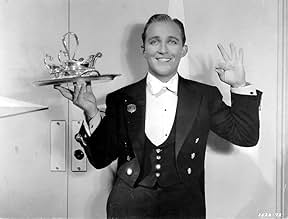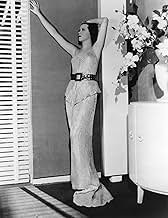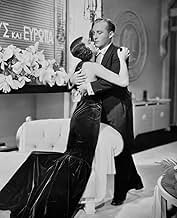A rich and famous singer disguises himself as a waiter in order to be near the woman he loves, a European princess.A rich and famous singer disguises himself as a waiter in order to be near the woman he loves, a European princess.A rich and famous singer disguises himself as a waiter in order to be near the woman he loves, a European princess.
Charles Arnt
- Higgins - Paul's Valet
- (as Charles E. Arnt)
Louise Carter
- Charity Lady
- (uncredited)
Mary Flynn
- Young Yacht Guest
- (uncredited)
Donald Gray
- Young Yacht Guest
- (uncredited)
Robert Klein
- Cloche
- (uncredited)
Cromwell McKechnie
- Paul's Secretary
- (uncredited)
Albert Petit
- Paul's Waiter
- (uncredited)
George Polonsky
- Paul's Chauffeur
- (uncredited)
Storyline
Did you know
- TriviaOriginally developed as a vehicle for Gary Cooper and Elissa Landi, but Cooper changed his mind after deciding that a love story about a duchess and a waiter wasn't for him and turned down the role. The parts were eventually given to Bing Crosby and Kitty Carlisle.
- Quotes
Countess Rostova: Who do you think was in my bedroom?
Nicki, aka Prince Nickolas: I can't imagine.
- ConnectionsReferenced in Movie Melodies on Parade (1936)
Featured review
HERE IS MY HEART (Paramount, 1934), directed by Frank Tuttle, stars Bing Crosby in a fairy-tale type romance not so much in the Maurice Chevalier and Jeanette MacDonald flavor of LOVE ME TONIGHT (Paramount, 1932), but something re-platted from Alfred Sevoir's stage production, "The Grand Duchess and the Waiter," and the 1926 silent Paramount comedy featuring Adolphe Menjou and Florence Vidor. As with many silent movies, most were remade or recycled with sound. For this sound edition, the grand duchess is now a princess and the waiter not only sings but offers a flare for comedy as well.
The story revolves around a 28-year-old John Paul Jones (Bing Crosby), songwriter and former radio singer who, after inheriting a million dollar fortune, makes a list of things to do, fulfilling his lifelong fantasies. Checked off is one where he rescues a damsel in distress, a damsel who happens to be Claire Hastings (Marian Mansfield), one of the guests upon his yacht, the S. S. Bon Homme Richard. His next check off on his "bucket list" is fishing right in the center of the Atlantic Ocean. Later that evening, J. Paul receives a telegram from his friend, James Smith (William Frawley), a reporter from the Paris Chronicle, notifying him that he's located the owner of the second pistol once owned by the American Revolutionary hero, John Paul Jones (whose name is, according to J. Paul, "a coincidence, not descendant"), the pistol he hopes to buy and add with the one he currently owns to present to the U. S. Naval Academy. Heading for Monte Carlo to make arrangements with the gun owner, J. Paul, after registering at the luxurious Hotel D'Athene, encounters an attractive but snobbish woman (Kitty Carlisle) in the elevator. He is later told by Smith that the woman in the elevator happens to be the Princess Alexandra, owner of the second pistol who refuses to sell the item to anyone who's not royalty. Because of J. Paul's background, he is told the princess refuses to sell it to him at any price. After a drunken waiter (Arthur Housman) loses consciousness while delivering a tray of food to the Princess's room, J. Paul, mistaken for the waiter, assumes the role so to be closer to the princess and her upperty family consisting of the Countess Ristova (Alison Skipworth), Prince Nicholas (Roland Young) Prince Vova Vladimir (Reginald Owen) and their talking parrot. J. Paul even goes to the extreme measures with every breath he takes by buying the hotel for himself. Learning the princess to be extremely bored with life, J. Paul also finds the royal family not what they seem to be Others featured in the cast are: Cecilia Parker (Suzette); Akim Tamiroff (The Hotel Manager); Charles Wilson (The Yacht Captain); and Charles Arnt (Higgins).
The musical soundtrack composed by Ralph Rainger, Leo Robin and Lewis Gensler include: "June in January" (sung by Bing Crosby); "Love is Just Around the Corner" (sung by Crosby and Marian Mansfield); "June in January" (reprise by Crosby while listening to his own recording); "Italian Opera Song" (sung by Kitty Carlisle); "With Every Breath I Take" (sung by Crosby); "With Every Breath I Take" (Crosby and Carlisle); "Love is Just Around the Corner," "With Every Breath I Take" and "June in January." Of the few songs written for the screen, "June in January" gets the most and best treatment here. As much as the title, HERE IS MY HEART might have some indication of this being a medical story involving heart transplants, or a romantic comedy set on Valentine's Day, it's a wonder whether or not such a song bearing its movie title might have been considered as another song interlude that was scrapped. Considering the movie title sounding more like a song tune than having any connection with the plot is somewhat typical for its time as movie titles go.
Unseen and unavailable for decades, HERE IS MY HEART has become the least known of all the Bing Crosby/Paramount musicals from the 1930s. Sometime in the 1980s during a pledge drive from WNET, Channel 13's New York City based public television station, it was Kitty Carlisle, Crosby's co-star from this and SHE LOVES ME NOT (Paramount, 1934), who mentioned in an interview that her second film with Crosby, HERE IS MY HEART "isn't around anymore." Though it wasn't fully expressed whether the movie was officially lost with no surviving prints available or not, HERE IS MY HEART has fortunately survived and available in full glory on DVD in 2000 as part of the "Bing Crosby Collection", with MISSISSIPPI (1935) on its flip side of the disc. Though Crosby seemed to have better on-screen chemistry with Mary Carlisle than he did with the sophisticated Kitty, HERE IS MY HEART, at 76 minutes, is a worthy rediscovery and one to check off your list of Bing Crosby movie titles to see. (***1/2)
The story revolves around a 28-year-old John Paul Jones (Bing Crosby), songwriter and former radio singer who, after inheriting a million dollar fortune, makes a list of things to do, fulfilling his lifelong fantasies. Checked off is one where he rescues a damsel in distress, a damsel who happens to be Claire Hastings (Marian Mansfield), one of the guests upon his yacht, the S. S. Bon Homme Richard. His next check off on his "bucket list" is fishing right in the center of the Atlantic Ocean. Later that evening, J. Paul receives a telegram from his friend, James Smith (William Frawley), a reporter from the Paris Chronicle, notifying him that he's located the owner of the second pistol once owned by the American Revolutionary hero, John Paul Jones (whose name is, according to J. Paul, "a coincidence, not descendant"), the pistol he hopes to buy and add with the one he currently owns to present to the U. S. Naval Academy. Heading for Monte Carlo to make arrangements with the gun owner, J. Paul, after registering at the luxurious Hotel D'Athene, encounters an attractive but snobbish woman (Kitty Carlisle) in the elevator. He is later told by Smith that the woman in the elevator happens to be the Princess Alexandra, owner of the second pistol who refuses to sell the item to anyone who's not royalty. Because of J. Paul's background, he is told the princess refuses to sell it to him at any price. After a drunken waiter (Arthur Housman) loses consciousness while delivering a tray of food to the Princess's room, J. Paul, mistaken for the waiter, assumes the role so to be closer to the princess and her upperty family consisting of the Countess Ristova (Alison Skipworth), Prince Nicholas (Roland Young) Prince Vova Vladimir (Reginald Owen) and their talking parrot. J. Paul even goes to the extreme measures with every breath he takes by buying the hotel for himself. Learning the princess to be extremely bored with life, J. Paul also finds the royal family not what they seem to be Others featured in the cast are: Cecilia Parker (Suzette); Akim Tamiroff (The Hotel Manager); Charles Wilson (The Yacht Captain); and Charles Arnt (Higgins).
The musical soundtrack composed by Ralph Rainger, Leo Robin and Lewis Gensler include: "June in January" (sung by Bing Crosby); "Love is Just Around the Corner" (sung by Crosby and Marian Mansfield); "June in January" (reprise by Crosby while listening to his own recording); "Italian Opera Song" (sung by Kitty Carlisle); "With Every Breath I Take" (sung by Crosby); "With Every Breath I Take" (Crosby and Carlisle); "Love is Just Around the Corner," "With Every Breath I Take" and "June in January." Of the few songs written for the screen, "June in January" gets the most and best treatment here. As much as the title, HERE IS MY HEART might have some indication of this being a medical story involving heart transplants, or a romantic comedy set on Valentine's Day, it's a wonder whether or not such a song bearing its movie title might have been considered as another song interlude that was scrapped. Considering the movie title sounding more like a song tune than having any connection with the plot is somewhat typical for its time as movie titles go.
Unseen and unavailable for decades, HERE IS MY HEART has become the least known of all the Bing Crosby/Paramount musicals from the 1930s. Sometime in the 1980s during a pledge drive from WNET, Channel 13's New York City based public television station, it was Kitty Carlisle, Crosby's co-star from this and SHE LOVES ME NOT (Paramount, 1934), who mentioned in an interview that her second film with Crosby, HERE IS MY HEART "isn't around anymore." Though it wasn't fully expressed whether the movie was officially lost with no surviving prints available or not, HERE IS MY HEART has fortunately survived and available in full glory on DVD in 2000 as part of the "Bing Crosby Collection", with MISSISSIPPI (1935) on its flip side of the disc. Though Crosby seemed to have better on-screen chemistry with Mary Carlisle than he did with the sophisticated Kitty, HERE IS MY HEART, at 76 minutes, is a worthy rediscovery and one to check off your list of Bing Crosby movie titles to see. (***1/2)
Details
- Release date
- Country of origin
- Language
- Also known as
- The Duchess and the Waiter
- Filming locations
- Production company
- See more company credits at IMDbPro
- Runtime1 hour 17 minutes
- Color
- Aspect ratio
- 1.37 : 1
Contribute to this page
Suggest an edit or add missing content

















